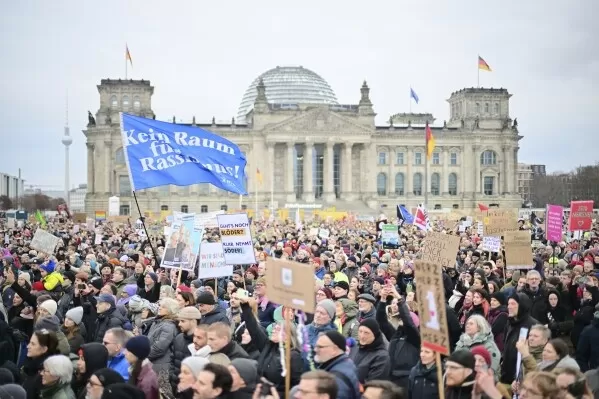Protests Erupt in Berlin Over CDU's Cooperation with Far-Right AfD Party
Tens of thousands of demonstrators gathered in Berlin to protest against the Christian Democratic Union (CDU) party’s recent cooperation with the far-right Alternative for Germany (AfD) party. The protests came as Germany heads toward snap federal elections, with growing concerns about the impact of anti-immigration policies and the potential rise of far-right influence in the government.

Context & Background:
Germany is at a crossroads as it prepares for its snap federal elections on February 23rd. Political tensions have been rising, particularly surrounding the issue of immigration, which has sparked significant debate in the country in recent years. The Christian Democratic Union (CDU), currently the main opposition party, has recently been accused of breaking a long-standing political taboo by seeking the support of the far-right Alternative for Germany (AfD) party.
Historically, Germany has maintained a clear distance from the far-right due to the country’s painful history with Nazi atrocities. However, the CDU’s recent collaboration with the AfD over an anti-immigration bill has ignited a firestorm of controversy and public protest. The coalition’s attempt to pass restrictive immigration measures has been met with strong opposition from various political groups and civil society organizations, leading to massive protests in Berlin.
Main Developments:
Tens of thousands of people gathered in Berlin to voice their opposition to the CDU’s move to collaborate with the AfD. Police estimates suggest that at least 160,000 people participated, while organizers claim the number was closer to 250,000. The protesters, who marched towards the CDU headquarters, carried banners and chanted slogans denouncing the party for seeking the support of the far-right. One popular chant was "Shame on you, CDU," directed at the party for its apparent shift to the right.
The protesters also expressed outrage over the CDU’s recent actions, accusing party leader Friedrich Merz of making a “deal with the devil” by cooperating with the AfD to pass an anti-immigration bill. This bill, which aims to block undocumented foreigners, including asylum seekers, from entering Germany, has sparked a fierce debate over the country’s immigration policy. While the bill was nonbinding, it marks a significant step towards more restrictive immigration measures.
The CDU’s efforts to gain the AfD’s support have come just weeks before the federal election, which has raised concerns about the party’s political strategy and the potential consequences for Germany’s democratic values. The collaboration with the far-right has been described as a dangerous flirtation with extremist politics, with critics warning that it could embolden the AfD and other far-right groups in the country.
Analysis:
The growing influence of the AfD and the CDU’s willingness to engage with them represents a significant shift in German politics. Historically, the CDU and its predecessor parties have been committed to democratic values and distancing themselves from extremist ideologies. However, as public sentiment has shifted, particularly in response to the arrival of large numbers of refugees and asylum seekers, some segments of the CDU have adopted more hardline positions on immigration, making deals with the AfD more politically attractive.
The protests in Berlin highlight the deepening divisions in Germany over immigration policy. Many in the country view the AfD’s positions as extreme and xenophobic, and the idea of collaborating with such a party is seen as a betrayal of Germany’s democratic principles. Chancellor Olaf Scholz has warned that this could pave the way for the far-right to gain more power, as has happened in neighboring Austria, where right-wing parties have formed governing coalitions.
However, Friedrich Merz, the leader of the CDU, has defended his party’s actions, arguing that Germany’s immigration policies need to be reformed to address the challenges posed by the arrival of refugees and asylum seekers in recent years. Merz has promised a reversal of the more open-door policies implemented by former Chancellor Angela Merkel, which were met with both praise and criticism during her tenure. Merz’s stance on immigration, combined with his outreach to the AfD, has sparked outrage among those who believe that Germany should maintain its commitment to inclusivity and human rights.
Regional Focus:
The protests in Berlin reflect broader concerns about the rise of far-right politics across Europe. In neighboring countries like Austria, far-right parties have gained political power, often through alliances with more mainstream conservative groups. The CDU’s outreach to the AfD has raised fears that a similar situation could unfold in Germany, potentially leading to a coalition government that would undermine the country’s democratic values and its commitment to welcoming refugees.
The immigration debate in Germany is particularly heated due to the country’s history of accepting large numbers of refugees, especially during the 2015 migration crisis. While many Germans have supported policies of openness and integration, others have grown increasingly concerned about the social and economic impact of immigration. These concerns have fueled the rise of anti-immigrant sentiments and far-right movements, creating a challenging political landscape for parties like the CDU.
Conclusion:
The protests in Berlin are a reflection of the deepening political divide in Germany over immigration policy and the growing influence of far-right parties. The CDU’s recent attempt to collaborate with the AfD has sparked widespread outrage, with many viewing it as a dangerous shift toward extremism. As Germany approaches its snap federal election, the political landscape remains highly polarized, and the outcome of this election will have significant implications for the country’s future direction.
Chancellor Olaf Scholz’s warning about the potential for a far-right coalition in Germany underscores the risks posed by the CDU’s actions. While the CDU has defended its approach, promising reforms to address immigration issues, critics argue that cooperating with the AfD threatens the country’s democratic values and its commitment to human rights. As the election approaches, the question remains: will Germany continue to embrace its democratic ideals, or will the rise of the far-right alter its political landscape for years to come?
What's Your Reaction?














